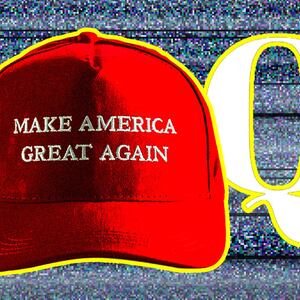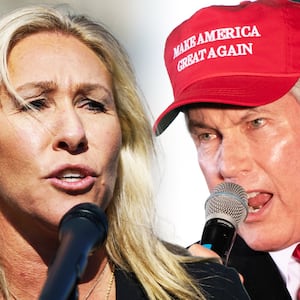The chaos of Donald Trump’s legal troubles naturally spills over into the way the public reacts to even the most incremental bits of news from courtrooms across the country.
On Wednesday, the pandemonium claimed its latest victim: prominent MAGA lawyer L. Lin Wood Jr.
In a court memo filed at sunrise, Atlanta prosecutors working on the massive election fraud case there warned a judge about a potential conflict of interest that could affect several Trump associates accused of crimes. Seven pages in, they noted that Wood is among many people being considered state witnesses at the upcoming trial.
The Messenger reported that Wood “turned state witness.” Meanwhile, Rolling Stone described it as Wood “cooperating… against Trump.” Anti-Trump voices on the right and left salivated at the idea. Even Senator Sheldon Whitehouse (D-RI) chimed in: “Expect more and more Trump cronies to flip as the Georgia racketeering trial approaches. Trickles can become floods.”
The celebration was premature.
“No!” Wood exclaimed on an afternoon phone call with The Daily Beast. “The media took it and ran with this idea that I’d flip on President Trump. What did I flip about? What factual knowledge would I have in any way about President Trump? No more than you have about watching the media.”
All that happened is that Wood got a subpoena that’ll force him to show up in court. The misunderstanding serves as a helpful guide to the arduous year ahead, in which the former president is expected to face trials in New York for bank fraud and faking business paperwork, in Washington for attempting a coup, in Florida for hoarding classified records, and in Atlanta for trying to overturn the election there.
The lesson? Witnesses aren’t all friendly. In fact, this one could be quite hostile—just maybe not useless.
“I am a loyal supporter of President Trump,” Wood clarified, just in case anyone thought he’d switched sides. “I had concerns about the 2020 election. I don’t have any firsthand knowledge of whatever Sidney [Powell] was doing in January of 2021 in Coffee County. I don’t even know who Mr. [Ken] Chesebro is.”
In this case, Wood has at least some knowledge of how key players exacted the litigation arm of Trump’s attempts to stay in power by suing to overturn election results. His story could contradict other testimony from Trump’s co-defendants—or bolster it. Only the Fulton County District Attorney really knows how she plans to use Wood. But Wood doesn’t appear to have “flipped.”
Wood noted he already testified before the special purpose grand jury that initially recommended DA Fani Willis officially seek indictments with a formal grand jury. As we learned earlier this month, that special panel’s final report actually advised Willis to indict Wood with an almost unanimous vote of 20-to-1, meaning Willis eventually decided it wasn’t worth pursuing criminal charges against him—at least with this indictment.
“Answered all their questions for an hour-and-a-half. And I haven’t spoken to them since,” Wood said.
In fact, Wednesday’s only real revelation is that Wood isn’t out of the woods just yet.
“The state can name anyone it likes as its witness. This doesn’t mean the witness will be called or that the witness will cooperate,” explained Jenny Carroll, a professor at University of Alabama’s law school.
Case in point: The New York Attorney General plans to call several of Trump’s bankers, accountants, and insurers at his upcoming civil trial scheduled to start next month. They’re incentivized to be truthful—after all, they’ll be testifying under oath under penalty of perjury. But they’re also inclined to be less than forthcoming. Bankers don’t want to say they were in on it, accountants don’t want to seem like morons, and insurers don’t want to appear as if they were duped.
Hence why the proverbial jury is still out on Wood. It’s unclear what role, if any, the lawyer could play in Willis’ case.
“We have no idea whether he’ll be a hostile witness on the stand, nor whether he is testifying under a grant of immunity or in return for other advantages that the state can grant,” noted Kay Levine, Emory University law school’s associate dean for research.
Going into the weeds of the 103-page legal filing doesn’t really offer any more clues. The Fulton County DA’s Office was merely notifying the state judge of a supposed conflict of interest involving Harry W. MacDougald, a defense lawyer representing Jeffrey Clark, the disgraced former federal prosecutor who tried to serve as Trump’s loyal insurrectionist at the Department of Justice.
According to the DA’s team, MacDougald could face some ethical troubles when questioning Wood in court, because they both worked together on a few failed court cases challenging the 2020 election.
“The conflict of interest language is probably meant to convey something more formal, at least at this stage,” Levine said.
It might even be something particularly obtuse that relates specifically to the legal profession. Wood said he independently pursued a 2020 election challenge in Georgia and only roped in MacDougald because of the other lawyer’s experience in dealing with the Supreme Court, which they hoped would hear the case. It didn’t, and the case went nowhere.
“I didn’t view Harry as my lawyer, but he was on the pleadings. He did render some assistance. I never retained him, but I appreciated his help. There was no fee agreement. I think he was just trying to be helpful,” Wood said.
The QAnon-aligned attorney, who recently quit in the midst of a disbarment case, acknowledges that his name is listed alongside MacDougald and Powell in one election challenge that was filed against Georgia’s governor. But MacDougald already clarified the situation in a sworn affidavit he filed last year in Wood’s professional disciplinary case, saying that the retiring Atlanta lawyer was actually barely involved at all.
“Mr. Wood had no involvement to my knowledge in the preparation and filing of the complaint. I edited, signed, and filed the lawsuit,” MacDougald wrote on May 18, 2022.
Carroll, the Alabama law professor, pointed out that the DA’s office might be concerned about a potential conflict of interest that could arise given MacDougald’s potential knowledge about what his fellow lawyers was up to back then. And it could be nothing more.
“Defense counsel has presumably had conversations with Wood that are covered under the attorney-client privilege. You don’t want to risk referencing or being influenced by that information in your cross-examination,” she said.
But it’s still something judges could take seriously, because any minor issue could have outsized importance much further down the road—especially in a case against someone like Trump, who appeals every single possible judicial action until the matter is a festering corpse that annoys judges.
“The witness can waive the conflict, but judges tend to be nervous about this because this is the type of thing that comes back on appeal,” Carroll said.
On the Wood matter, the next step is up to the judge. And of course, there’s already some history there too. In June, Superior Court Judge Scott McAfee—who’s overseeing this massive racketeering case—slapped Wood with $5,000 in criminal contempt fines for flagrantly violating a previous order prohibiting him from insulting his former law partners.
However, Wednesday’s news did accomplish one thing: It drew the public’s attention back to Wood, who still harbors some resentment against key MAGA figures.
He’s still annoyed at Powell for involving him in her tentacled supermonster “Kraken” network of lawsuits across the country.
“Sidney put my name on it. Why? That’s a good question. I didn’t do anything,” he said.
The problem is, this Powell-Wood relationship is cemented in history. A major investigation published by ProPublica last year detailed how Wood became the glue that held the Big Lie together when he invited Powell, Army general-turned-conspiracy theorist Mike Flynn, and a team of subject matter experts in computer security and military intelligence to his South Carolina plantation, called Tomotley, in the days after the election.
“She asked to come to Tomotley and work with a couple of people, and I said yes… I told Sidney she could come. It was just a general offer of help. I extended my hospitality to her. Then Mike Flynn showed up,” Wood said with a groan.
“I thought they were working on the election… I was not working with them, other than having casual conversation where she might tell me something. I just wasn’t involved,” he professed. “As a lawyer, I didn’t think a fraud case was the way to go.”
But he’s bitter now. The last time he reached out to Powell, he said, was to leave a stern voicemail demanding that she cover his legal bills—particularly his share of the $120,000 sanction imposed by a federal judge in Michigan against him and the six other Kraken counsel.
“I said, ‘If this judge sanctions me, I’m not gonna pay it. You should pay it.’ It was her lawsuit. I shouldn’t have to pay it,” he said.
And so the real news isn’t that Wood flipped against Trump. It’s that he might prove useful to prosecutors against others—wittingly or unwittingly.
“I would not extend hospitality to Sidney Powell again. It’s my own opinion she got me involved in something that’s nothing but trouble,” he said.








